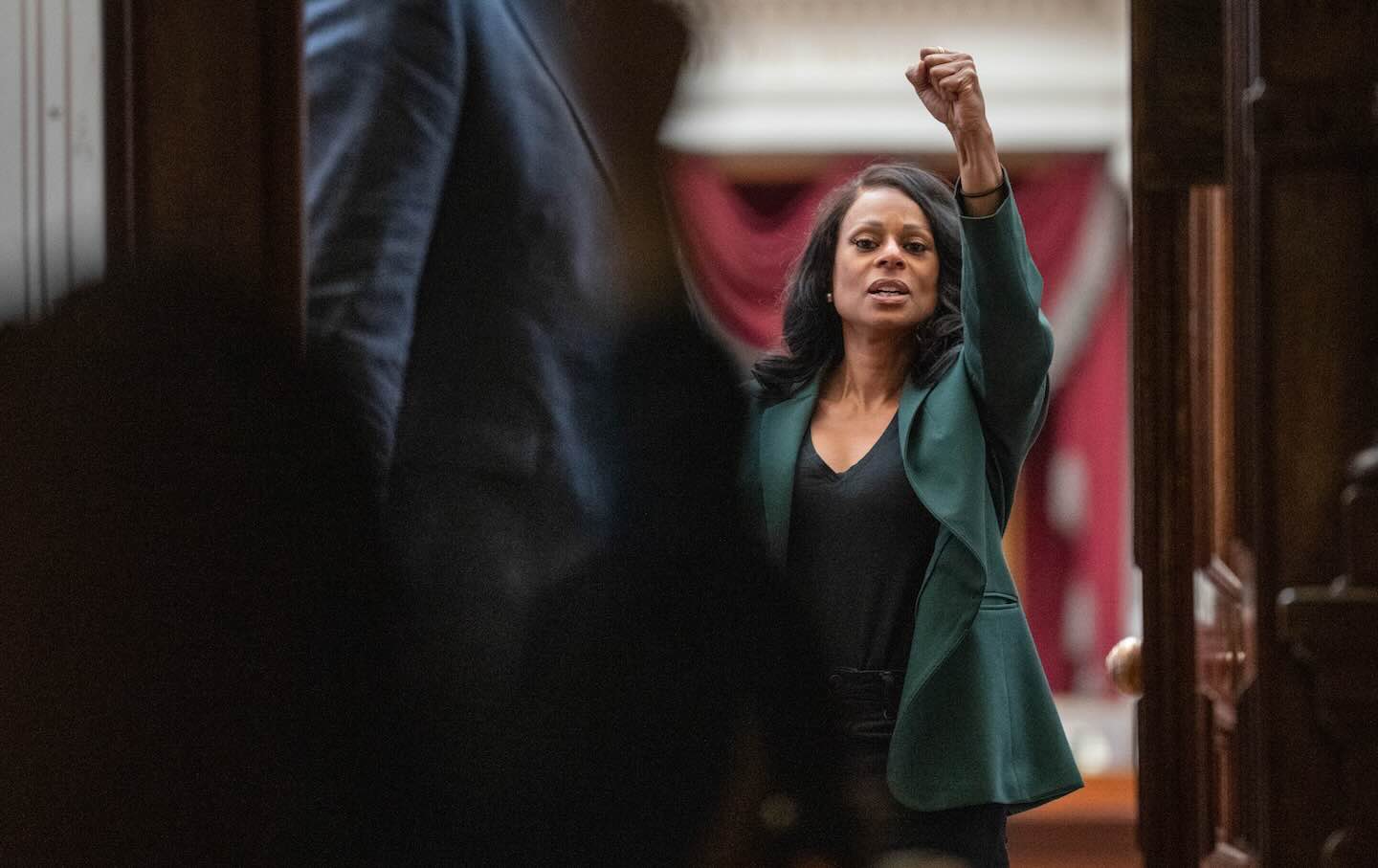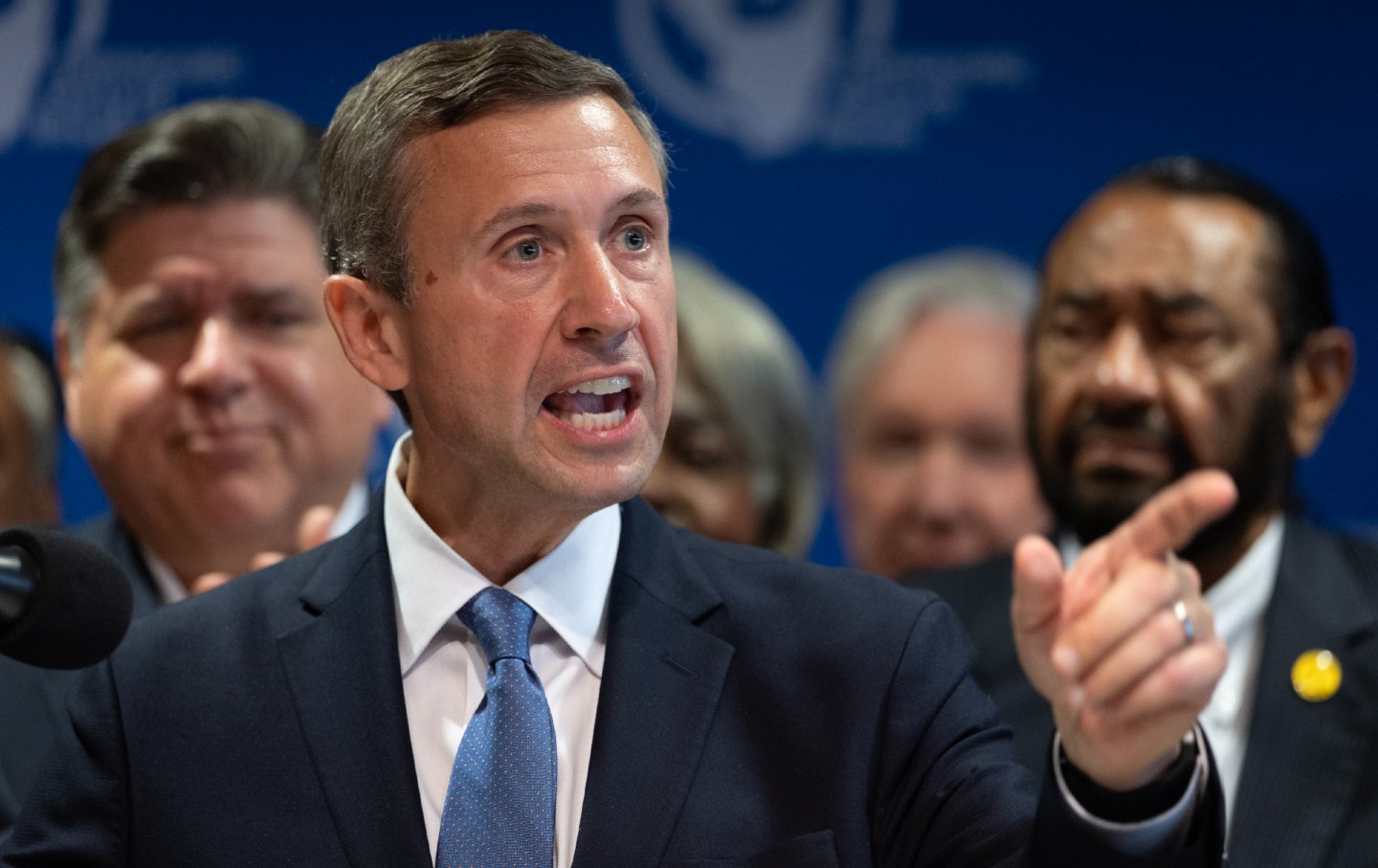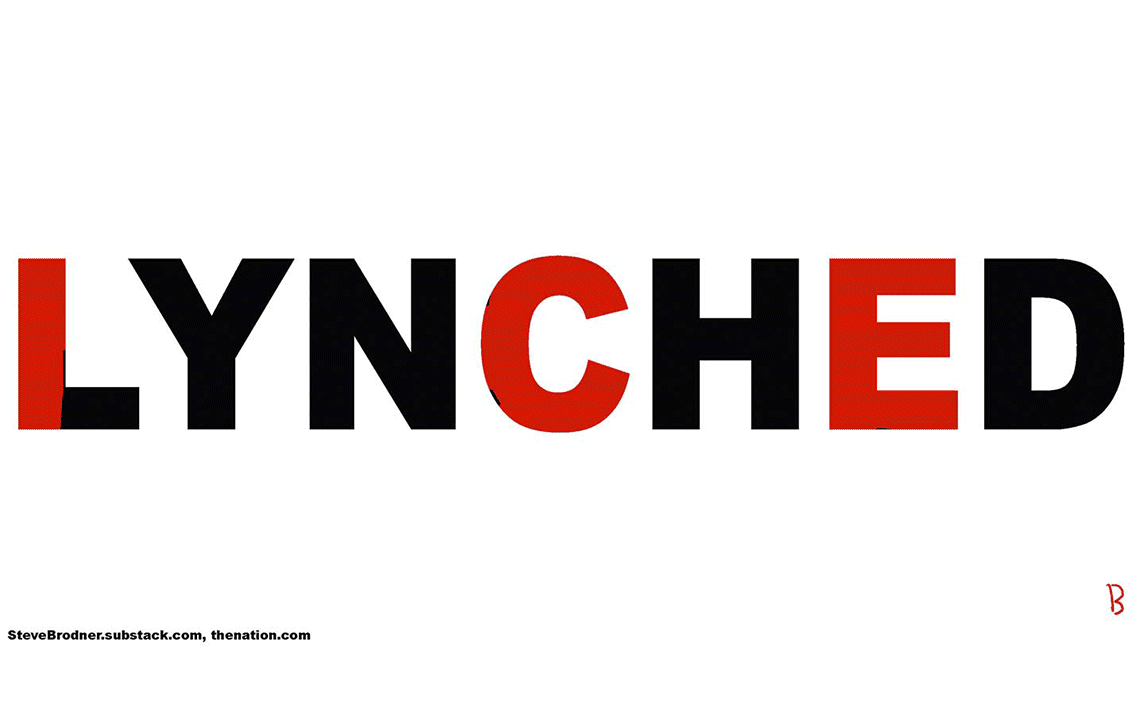The Gaza Genocide Is a Test for American Democracy
The public overwhelmingly opposes the genocide, but the political elites help keep it going. Something has to give.

Members of Jewish Voice for Peace are led away after being arrested for occupying the New York offices of Senators Chuck Schumer and Kirsten Gillibrand on August 1, 2025.
(Michael Nigro / Pacific Press / LightRocket via Getty Images)Israel’s slaughter and engineered famine in Gaza is producing wrenching images of starving children so horrifying that even members of the American political elite, traditionally a group with a high tolerance for the mass murder of ordinary people, feel compelled to make pro forma objections.
New York Times reporters are now lamenting that the starvation is harming Israel’s “standing in the world.” Times columnist Michelle Cottle acknowledges that the images of starvation have caused a “tipping point both globally and here in the U.S., and now politicians who had been mostly quiet when it came to criticizing Israel are starting to speak out.” Former Times reporter Bari Weiss, now an influential conservative maven at The Free Press, went from publishing articles decrying the “Gaza Famine Myth” to admitting that, yes, there is a “hunger crisis.” The blogger Matthew Yglesias, always a reliable barometer of establishment conventional wisdom, used the Free Press shift to indicate that he himself was ready for a new stance: Though he once believed that pro-Palestinian protesters had “poisoned the waters to an extent” by crying wolf, he could concede that “the wolves are now in fact here.”
It’s natural and forgivable to be annoyed by this belated and partial acknowledgement of reality, which seems to be mainly an exercise in reputational damage control rather than motivated by any genuine revulsion against atrocities. Yglesias himself is well-practiced at this game, since, like much of the mainstream media, he went from being an ardent cheerleader of George W. Bush’s invasion of Iraq to being a critic as soon as the high tide of public support for the war started receding.
The Gaza movement was never crying wolf. Rather, activists were drawing the logical conclusions from the words and actions of Israeli leaders, which always pointed to the horrifying endgame of ethnic cleansing and genocide. Israel’s policy of using starvation as a weapon of war in Gaza dates back to at least 2006. Contra Yglesias, the wolves have always been real and have feasted for many years.
Yet the glib cynicism of pundits is less important than the actual policy changes that might result from shifting public opinion. It’s undoubtedly the case that for the first time, pro-Palestinian politics are establishing a beachhead in American politics. This is admittedly happening belatedly and far too slowly, but change is in the air.
Vermont Senator Bernie Sanders has taken the lead in pushing for an end to “offensive” arms sales to Israel. This is an inadequate remedy—the sale of all arms, whatever their intended use, should be halted—but it remains one of the first serious legislative pushes against America’s long-standing policy of uncompromising support for Israel. When Sanders brought the arms sales issue to a vote in April, only 15 senators voted for it. When he again pushed for arms limitations on Thursday, he got 27 votes (all Democrats or allied, as Sanders is, with the party).
This falls far short of the mark, but represents a historical pivot point: For the first time, a majority of Democratic senators have backed limits on weapons sales to Israel. However, as my Nation colleague John Nichols pointed out last week, the Senate (and by extension the larger political elite) still lags behind popular opinion. Matt Duss of the Center for International Policy noted, “While a majority of Democrats voting to block military aid to Israel is real progress, it’s still shameful that a majority of the Senate voted against. If the body accurately represented Americans’ views on Gaza the resolutions should’ve passed easily.”
It’s worth underscoring the radical disconnect between public opinion and the political elite (and its media allies). While Israel enjoyed a brief and slight level of popular support in the immediate aftermath of the October 7 attack, its criminal conduct in Gaza has never been popular. Gallup’s polls on this are instructive. Even in November 2023, when memories of October 7 were fresh, Israel enjoyed only a small level of support: 50 percent approval versus 45 disapproval. Net approval ended the following month. By March of 2024, it was down to 36 percent approval versus 55 percent disapproval. Currently, it stands at 60 percent disapproval and 32 percent approval.
In other words, unlike their elected representatives, the American public did not need to wait for the recent soul-crushing photographs of starving children to decide they were against this abomination. They figured that out nearly 18 months ago.
The turn against Israel has been particularly strong among Democrats. There is a reason the relentless attacks on Zohran Mamdani for being pro-Palestinian didn’t work in the New York Democratic mayoral primary: Most voters broadly shared his outlook. According to a recent Quinnipiac poll, 60 percent of Democrats now describe themselves as more sympathetic to Palestinians than to Israelis, as against 12 percent who are more pro-Israel. According to a Data for Progress poll, 63 percent of primary voters support arresting Israeli Prime Minister Benjamin Netanyahu for war crimes. According to CNN polling guru Harry Enten, “All of a sudden, it’s the pro-Palestinian position that actually reigns supreme in Democratic politics, not the Israeli position. I rarely ever see shifts like this.”
On Saturday, Bernie Sanders tweeted:
60% of Americans oppose Netanyahu’s barbaric war against the Palestinian people. We’re making progress in moving Democrats to vote against funding this war. Now it’s time to move Republicans. Does the average Republican want to spend billions starving children? I don’t think so.
Sanders raises a good question. While polling shows a strong shift against Israel among Democrats and independents, Republican support for Israel remains relatively unchanged. Yet even among Republicans, cracks in the pro-Israel position are showing. As Politico reports, “the GOP’s right flank is growing increasingly frustrated with the war in Gaza, arguing the war is politically noxious for the president and a moral stain on the country’s reputation.” Prominent MAGA voices, including Representative Marjorie Taylor Greene (who describes the situation as a “genocide”), are creating a space for a bipartisan shift in policy.
Popular
“swipe left below to view more authors”Swipe →The real question isn’t why the political elite is turning against the war but why they have been so slow to do so in the face of a massive shift in public opinion. Writing in Vox, Abdallah Fayyad quite reasonably cites the continued outsize power of the Israel lobby, which regularly spends tens of millions every election cycle to uphold the bipartisan pro-Israel consensus. Equally important is the role Israel plays as a bulwark of American power in the Middle East, which means the policymakers who take a pro-Israel line (notably former Joe Biden advisers such as Jake Sullivan and Brett McGurk) are always amply rewarded with corporate jobs and academic sinecures.
The pro-Palestinian position might have the numbers, but the pro-Israel stance controls the commanding heights of establishment power. Given this dynamic, Israel/Palestine becomes a litmus test for American democracy itself. How long can an elite continue with a policy that outrages the majority? This dynamic also reinforces the continued need for organizing and agitation: Progress has been made in an uphill battle, but only continued pressure will force the elite to finally listen to public opinion. The upcoming primaries, both in the 2026 midterms and the 2028 presidential race, now loom as the battleground for the essential battle between the people and the ruling class.
Take a stand against Trump and support The Nation!
In this moment of crisis, we need a unified, progressive opposition to Donald Trump.
We’re starting to see one take shape in the streets and at ballot boxes across the country: from New York City mayoral candidate Zohran Mamdani’s campaign focused on affordability, to communities protecting their neighbors from ICE, to the senators opposing arms shipments to Israel.
The Democratic Party has an urgent choice to make: Will it embrace a politics that is principled and popular, or will it continue to insist on losing elections with the out-of-touch elites and consultants that got us here?
At The Nation, we know which side we’re on. Every day, we make the case for a more democratic and equal world by championing progressive leaders, lifting up movements fighting for justice, and exposing the oligarchs and corporations profiting at the expense of us all. Our independent journalism informs and empowers progressives across the country and helps bring this politics to new readers ready to join the fight.
We need your help to continue this work. Will you donate to support The Nation’s independent journalism? Every contribution goes to our award-winning reporting, analysis, and commentary.
Thank you for helping us take on Trump and build the just society we know is possible.
Sincerely,
Bhaskar Sunkara
President, The Nation
More from The Nation

Yes, Texas Representative Nicole Collier Was Under “House Arrest” in the Texas Capitol Yes, Texas Representative Nicole Collier Was Under “House Arrest” in the Texas Capitol
Collier speaks about her surreal ordeal, wherein she refused to sign a permission slip and accept a police escort to leave the Austin statehouse and had to sleep there for two nig...

Democrats Need to Stop Letting Trump Set the Terms of Engagement Democrats Need to Stop Letting Trump Set the Terms of Engagement
With every White House action, from mass deportation to domestic deployment of federal troops the “opposition party” has accepted the premise and failed to offer an alternative.

The DNC Chair Proposes Major Reforms to Limit Big Money The DNC Chair Proposes Major Reforms to Limit Big Money
Party building vs. candidate addiction has never been more urgent.

Solidarity Staircase Solidarity Staircase
The stairways to iconic Park Güell in Barcelona were transformed into a representation of the Palestinian flag , and the plaza above was named “Free Palestine”, as a symbol of supp...

Trump Wants to Make Art Into a Tool of the State Trump Wants to Make Art Into a Tool of the State
In ordering a review of the Smithsonian, the White House wants to use its power to remake our culture—or to reinvigorate a strain in the culture that has been dormant for a long t...



